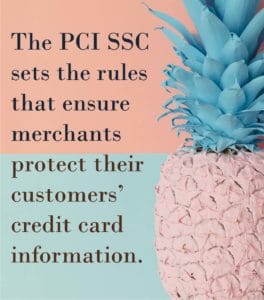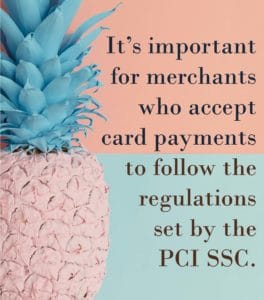If your business processes card payments, you’ve probably heard of PCI compliance. While PCI compliance is discussed a lot in the payments industry, it can be a little confusing. For today’s blog, we’re taking a quick look at the basics of PCI compliance: what it means, why it matters, and how to make sure you and your business are covered.
What does “PCI” even mean?
PCI is simply an abbreviation for “the payment card industry” when referring to The Payment Card Industry Security Standards Council (PCI SSC). The five biggest credit card providers (MasterCard, Visa, Discover, Amex and JCB International) founded the PCI SSC was founded in 2006.
This Council sets the rules that ensure merchants protect their customers’ credit card information during transactions and storage. This set of rules is called the Payment Card Industry Data Security Standard (PCI DSS).
What is PCI compliance?
If your company is PCI compliant then you are following the PCI DSS regulations. These regulations can be found online here and vary depending on the size of your business and volume your process.
Why should I worry about PCI compliance?
You are not required by law to be PCI compliant. However, it’s important for merchants who accept card payments to follow the regulations set by the PCI SSC. While failing to comply isn’t illegal, it’s extremely costly. Following PCI DSS regulations helps you to avoid potential data breaches and steep non-compliance fees.
Being PCI compliant benefits you, your business, and your customers. By making sure that your business and your processing follows the best practices, you protect your business from liability and your customers from breach. PCI compliance also protects your company from being hit with non-compliance fees.

What happens if I’m not PCI compliant?
If your business is not PCI compliant then you’re not following the best practices outlined by the PCI DSS. That means that your business and your customers are at risk. Businesses that don’t follow the PCI DSS guidelines are also able to be hit with non-compliances fees. So while remaining non-compliant isn’t illegal, it’s definitely costly.
How can Pineapple help me?
At Pineapple, we provide your business with a full-service payment processing experience. This means that we set you up with not just the tools, but the technology and expertise to ensure your business is PCI compliant. Our team of payments gurus work with you every step of the way—from onboarding to day-to-day maintenance—to make sure that you have the safest and most advanced processing tools at the best price available. Get in touch with us today to learn how Pineapple’s secure processing can freshen up and protect your business!

